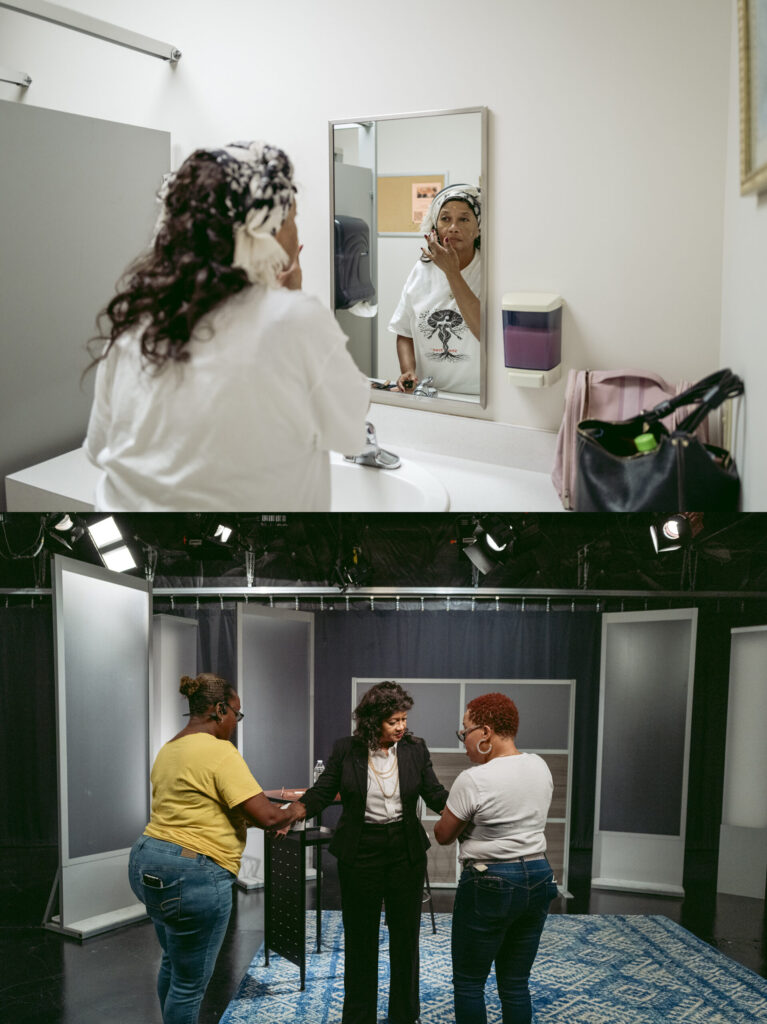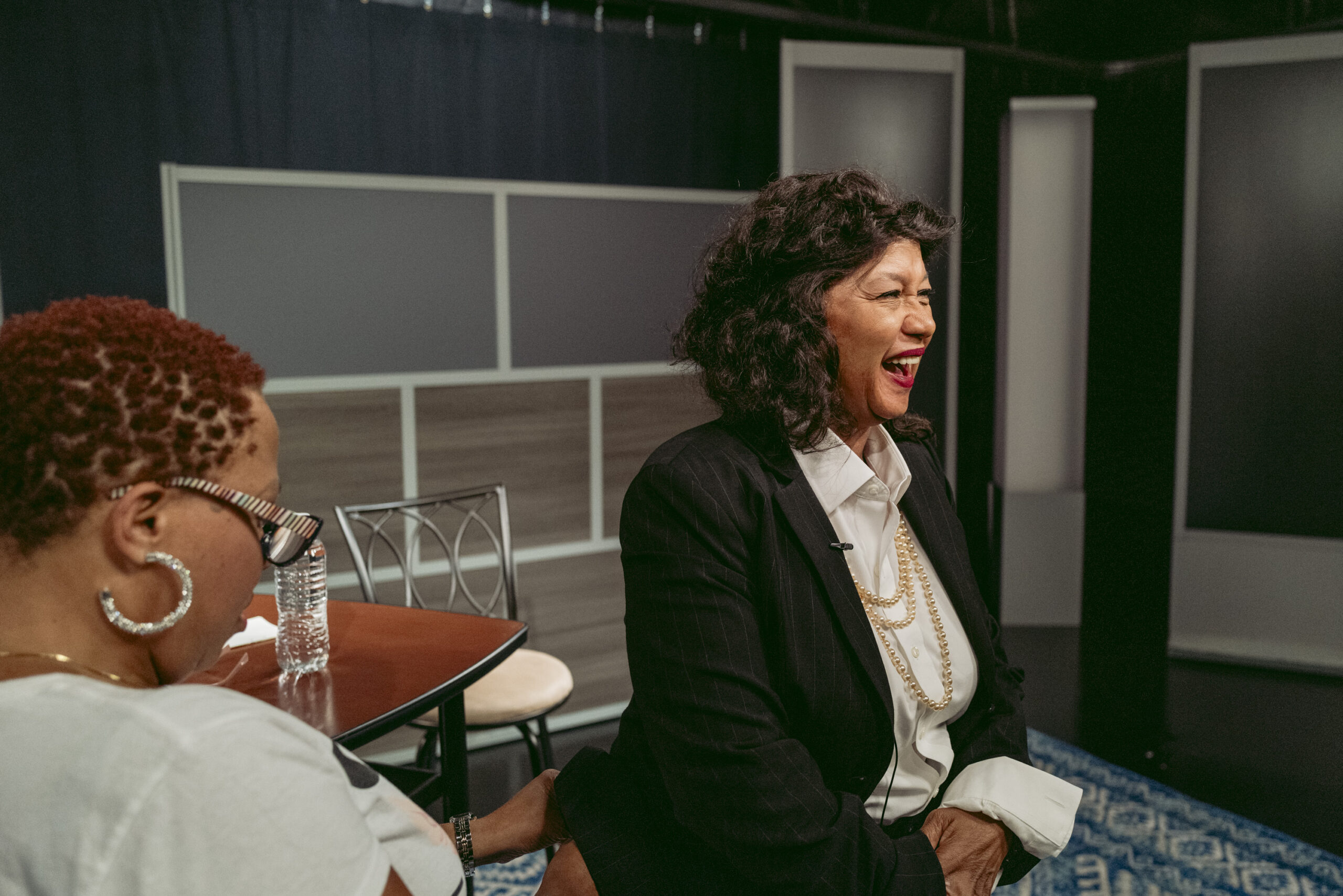“I have something on my heart that I want to say,” Shanita Poe told me one morning in July, standing in the prop room near Studio A at Access 21, one of the last remaining public-access studios in North Carolina.
She usually has a guest for her show, Phenomenal Woman, named for the Maya Angelou poem. But that day she was alone. Her head was wrapped in a scarf, and she wore a shirt with the design of a woman’s body transforming into a tree, arms branching out, afro blooming into a canopy. The words “She Tree” glowed red across the bottom.

She placed her phone on an apple box to record a Facebook Live documenting her pre-production process for her followers.
Just off of Morehead Street near the I-77 interchange, Access 21’s crew doesn’t talk about followers or engagement. They talk about helping creatives find their words and messages, and getting them out there in hopes that at least one person will be moved by it. The managers of Access 21 tell me that a preacher at another station once got a single call after his sermon — from a man who said it stopped him from taking his own life.
This place functions outside of the media we put our eyes on each day, heavily influenced by algorithms and influencers shaping the way we see the world. Inside Access 21, creativity, passion, and knowledge are passed down the old-fashioned way. Ideas come to life over pizza, and then friends come together to help someone speak their truth.


As a child of the 1990s, I’ve rewatched every “Wayne’s World” movie and grew up imitating comedians like Tom Green who helped define a genre straight from their local public access. I moved to Charlotte in 2009, when people still had cable packages, and remember seeking out Charlotte’s local access channel late in the evenings. I figured it could be an interesting way to see what a city was about.
It took me a dozen years to find the studio. On my first visit earlier this year, I missed the entrance. Then, in July, Access 21 announced the installation of a new sign to their 306 Instagram followers with the caption, “Now, people visiting for the first time will have a better idea of where we are located.”
As the city grows up, this space remains humble. On my first visit to the studio with my camera, I sat in on Basics of Production, a 2.5-hour class that runs every Thursday night for four weeks.
I was so enthralled that I kept coming back to document the work there.


Access 21 is not PBS, though the two are often confused, operations manager James Rossi tells me. The funding models are different, and public access objectives are even less commercial. Public access survives in most major cities because federal law allows local municipalities to require cable providers to fund a certain number of channels for PEG (Public, Educational, Government) support as part of their franchise agreements.
In Charlotte, the city negotiates these agreements and collects PEG fees from providers like Spectrum, then passes the money to the Charlotte Mecklenburg Public Access Corporation, the nonprofit that operates Access 21. Its 2024 budget showed revenue of about $460,000. If the city government ever stopped negotiating these deals, Access 21 would vanish.
“We’re not in this for the money,” executive director John Rocco says. The important part, Rocco says, is that it provides local citizens, whether journalists or creators, a place to tell stories not covered nationally. If you have something to say, they will help you say it.
And there’s a minimal barrier to entry: Mecklenburg County residents can buy memberships for $25. That gets you into the classes required to use the equipment.
Then it’s a choose-your-own adventure: production, directing, or podcasting. I tried a math class once. If you took every class the station offers, you would spend less than a year’s worth of ChatGPT Premium — and you’d make more friends.
Their podcasting studio is top-notch, with three high-quality mics, a great sound board, remote cameras, and a green screen. And you can have unlimited access for a one-time fee of less than $100, as long as you keep making content there.

During the free new member orientation, membership and community outreach director Tarik Kiley talked about what might be the most important aspect of Access 21: “It is a team effort, producing here. So, along the way, when you’re taking your training classes, I would suggest, honestly, make friends.”
It reminds me of when I graduated from art school. One of the toughest parts of creating on my own was not having that group of like-minded people around me to share ideas with. Creativity as a team sport, community media at the core.


On the day of Poe’s taping, I listened and made a few photos as she put on her makeup. “My kids are always so shocked and comment on how different I look once I get all this on.” The crew streamed into the greenroom for the food she’d prepared.
Soon they found their places, slipped on headsets, and Poe took her spot under the lights. “Does anyone know what to do with these sleeves?” she said, standing with both arms stretched out. “These are French cuffs and I forgot my cuff links.” The crew surrounded her, folding and smoothing the cuffs.
The studio doors shut and the room got quiet. Standing at a black high-top table she bowed her head and prayed — for the show, for the crew, and anyone who might be watching.

Poe is 62 and from Laurinburg. You’ve passed by it on your way to the beach. In her 20s, she wore a borrowed plaid skirt and landed a temp job at a bank in Charlotte. That turned into a full-time position, and eventually she found herself working on multimillion-dollar accounts. She’s also experienced some of the worst things in life. She’s been through divorce, and she’s been unhoused. Now she stands tall in black leather pumps, running businesses to help people who need a month’s rent to avoid homelessness. She hopes that her show will remind people — especially women — that when life’s tough, it doesn’t have to remain that way. She’s not reaching millions of followers, but she’s showing up with years of lived experience and wisdom.
As the red light came on camera 3, she looked directly into the camera: “It’s my pleasure and my honor to come before you and speak these words of life into you…”
She weaved through her points about finding success in life by helping other women. Then the light on camera 2 flashed. She locked in to that camera, while the camera operator nodded in approval as the show’s director, Vonne Bowman, gave affirmation through a headset. Then camera 3 lit up, and she looked there, up into the monitor, eyes wide and smiling.
This may all seem antiquated in the smartphone era. But in 2025 it also feels revolutionary. A salve for the constant scrolling. Slow food had a moment a few years ago. Maybe, I hope, Slow TV can have its day, too.


When I open Instagram, the algorithm feeds me nostalgia. Concerts without phones, playing outside until streetlights flicker on, birthday parties at McDonald’s. We hate parts of social media, yet we log in daily. In the 2024 book Filterworld: How Algorithms Flattened Culture, Kyle Chayka writes that “attention becomes the only metric by which culture is judged, and what gets attention is dictated by equations developed by Silicon Valley engineers.”
I often wonder whether, in 50 years, people will look back at our digital lives the way we do smoking today. Access 21 resists the addiction. No gatekeeping. No algorithms. An antidote to the media that flattens everything.
In a city that has rapidly gentrified its weirdness, Access 21 remains stubbornly unpolished. It tells us more about what the city actually is, to the people who don’t have massive followings, and what wisdom they have to share with the rest of us, if we’re willing to listen.
Poe ends every show by praying for her audience. Maybe that’s what makes this place feel revolutionary to me. Maybe it’s not just the access, but the belief that someone, somewhere, will be changed by what they see.

How to watch
Spectrum customers in Charlotte can view Access 21 on channel 21; and in Cornelius, Davidson, and Huntersville on channel 4.
- It’s also available on AT&T on channel 99, and via TDS Telecom, as well as streaming and online. View more options.
- You can also just come by the studio at 613 Calvert Street.
